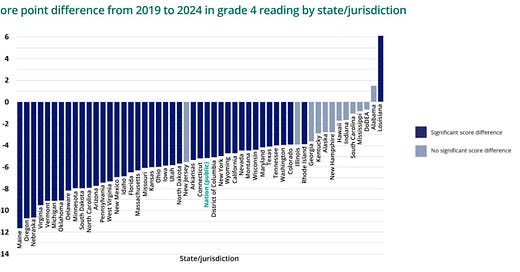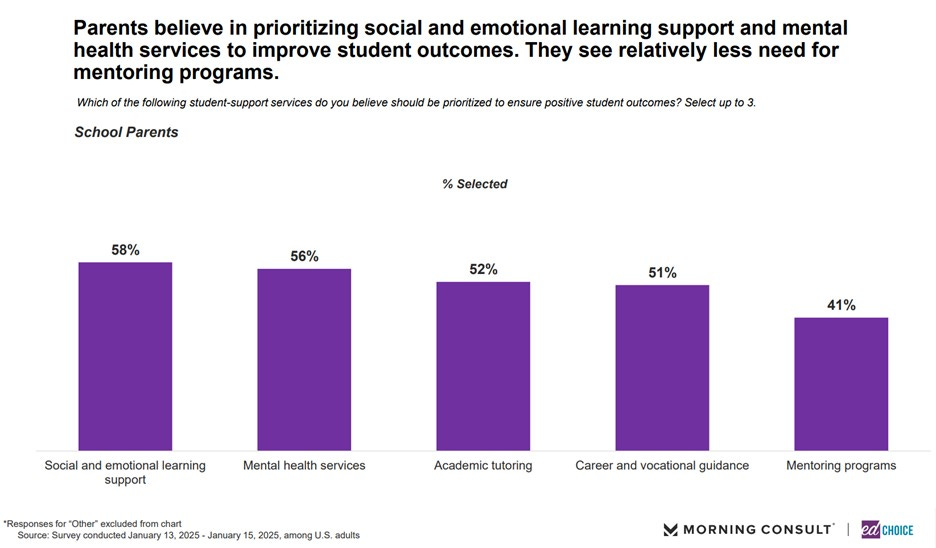What Parents Think Will Solve Learning Loss
The in-school and out-of-school strategies to turn around some dismal numbers
(This is a post by EdChoice research assistant extraordinaire Alli Aldis. Learn more about her here.)
Something must be done to improve student outcomes, because post-pandemic learning loss isn’t going away.
At least, that’s the takeaway of the newest standardized testing data from the National Assessment of Educational Progress (NAEP), aka the Nation’s Report Card. Scores for 2024 were released in January, and they paint a grim picture. Both fourth- and eighth-graders declined in reading comprehension—not just since 2019 pre-pandemic, but also since the most recent test in 2022. On the surface, math scores fared slightly better, with slight improvement in fourth grade math. However, the small gains in math scores were driven by high-performing students in the 75th percentile and above, while lower-performing students saw declines since 2022. In other words, lower-performing students are being left behind.
Source: NCES
So, how can we help students reach more positive outcomes?
That’s the question we posed to school parents in the latest iteration of our Public Opinion Tracker survey. In partnership with Morning Consult, EdChoice surveyed a nationally representative sample of American adults 18 and older (N = 2,253) from December 12, 2024 to January 15, 2025. With additional sampling, we obtained responses from 1,228 parents of children currently in K–12 education.
Parents believe the key to positive student outcomes is supporting kids’ mental health needs and social-emotional skills. We asked parents to prioritize services that would help student outcomes, choosing from a list of options. Parents place the highest priority on social and emotional learning support (58%) and mental health services (56%). This puts academic services like academic tutoring (52%) and career guidance (51%) firmly in a second tier—still important to parents, but not their chief concern.
For school-based support, parents think academic tutoring is the most effective way to boost student outcomes. Two-thirds of parents (67%) say that academic tutoring is very or extremely effective for improving student outcomes at school. They still see a strong need for mental health services (63%) and social and emotional learning support (62%) as well.
Unfortunately, the effectiveness of these strategies doesn’t mean they’re accessible to everyone. Sixty seven percent of school parents say academic tutoring is very effective, but only 49% say it’s very accessible. Similarly, only 43% of parents say that mental health services are very accessible at their child’s school. If we want to make strides in positive student outcomes, we need to bridge that gap between wish list support services and reality.
One last piece of the puzzle is student motivation. After all, you can lead a horse to water, but you can’t make him study for his algebra test. Perhaps unsurprisingly, school parents rate parental encouragement (74%) as a strong motivator for academic performance, alongside teacher support (75%) and students’ personal interest in subjects (76%). Peer influence (62%) and financial rewards (55%) are seen as less influential. That said, school parents are open to the idea of financial incentives. An overwhelming majority of school parents think that offering financial incentives would have a positive impact on student academic performance (87%), and 70% of parents consider it an appropriate reward for improving grades during the school year.
These worrying trends of learning loss open the door to rampant speculation about why this is happening and how we can fix it. Everyone seems to have a solution—and yet students are still falling behind. We’re all in uncharted territory here, even the education experts. I believe we need to take a step back from silver bullet solutions and focus on the basics. Let’s listen to what parents have to say about their students’ unmet needs. Mental health support for kids is needed, both at school and at home. It’s hard for students to focus on school if they’re struggling with depression, or anxiety, or ADHD. We can start by building a strong foundation of support for our students and go from there.
In a post-pandemic world, parents are starting to see the need for less-conventional approaches to improve student outcomes. Mental health is at the forefront of their minds. They also believe that student motivation for academics is rooted in parental and teacher support. Providing students with a strong support network in and out of school will be key to navigating—and overcoming—persistent learning losses.









